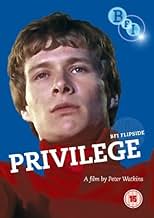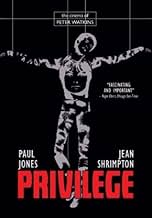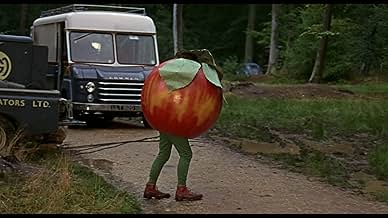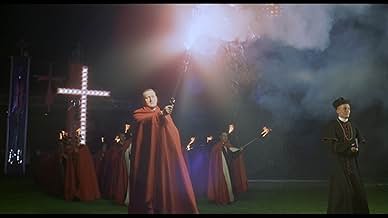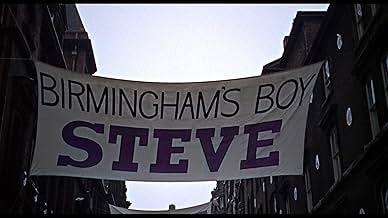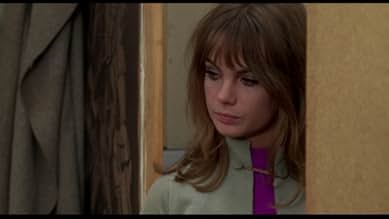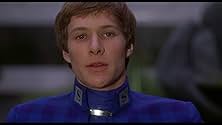Adicionar um enredo no seu idiomaBritain's biggest pop singer, Steven Shorter (Paul Jones), receives unwavering adulation and possesses total control over his rabid fans, which includes nearly the entire population. Yet Sho... Ler tudoBritain's biggest pop singer, Steven Shorter (Paul Jones), receives unwavering adulation and possesses total control over his rabid fans, which includes nearly the entire population. Yet Shorter is not an autonomous performer -- he is little more than a puppet for the government,... Ler tudoBritain's biggest pop singer, Steven Shorter (Paul Jones), receives unwavering adulation and possesses total control over his rabid fans, which includes nearly the entire population. Yet Shorter is not an autonomous performer -- he is little more than a puppet for the government, promoting whatever agenda they see fit. When a beautiful artist, Vanessa Ritchie (Jean Sh... Ler tudo
- Direção
- Roteiristas
- Artistas
- Prêmios
- 1 indicação no total
Avaliações em destaque
allow their artistic talents to be used to get people to buy Pepsi, right? The Beatles "Revolution" in a Nike ad is out of the question, true? Janis Joplin's estate wouldn't allow Mercedes-Benz to feature her tune about the car,
correct? We aren't being manipulated by that old time rock and roll, are we? Not even to buy "Like A Rock" Chevy trucks? Paranoid enough? Then you'll enjoy "Privilege".
"Privilege" is about pop star Steven Shorter, who has the teen population of Britain in the palm of his hand. Behind Steve, however, are the corporations and investors using him to control teens, which is pretty scary to think about, considering the same is very nearly true today. They decide everything for him: his appearance, what products he'll endorse, the songs he sings; and when he tries to break away and become an individual, that's it. The investors withdraw their support and the show's over. Steve controlled the public so well that with just one speech, he is able to turn the teens against himself.
I liked this movie. Perhaps the reason it did so poorly when originally released is because it didn't seem relevant. Today, it certainly is. The "futuristic" British society portrayed seems a bit of a stretch (at one point the crowds chant "We must conform! We must conform!"), but then, so does the society shown in 1984, in my opinion. Find this movie if you can, it's a great one and should be released on video!
The original songs by Mike Leander and rock versions of "Jerusalem" and "Onward Christian Soldiers" are catchy and provide the movie's best moments. Unfortunately, the film's stars do not match Watkins's ambitions. Paul Jones lacks a charismatic presence and fails to convince that he could move millions with his voice and image. Although Jones is only adequate as a dramatic actor, the former lead singer of the group Manfred Mann manages the stage sequences quite well. However, his non-singing dramatics lack depth and are largely expressionless. Although Jean Shrimpton is astonishingly beautiful as Vanessa Ritchie, the portrait artist, her talents as an actress are woefully lacking. Despite success as a fashion model, her lackluster performance herein was likely one reason she has only two film credits.
In support of the two leads, Shorter's handlers and the clergy are convincing, and the film has a fascination that transcends its flaws, which include lazy overuse of narration. The manipulation of religion for political ends is as relevant now as in the 1960's, and combining religious faith with popular music and canny advertising is still a potent mix. Burning crosses, hysteria-induced "miracles," screaming young women with tear-stained cheeks, pounding hymns and anthems, sinister-looking clergymen, police brutality: "Privilege" seems to have been drawn from "Triumph of the Will" and, in turn, later inspired "Pink Floyd, The Wall." An often powerful warning about the evils of mixing church and state, restricting individual rights, and following demigods, "Privilege" remains a flawed work that is definitely worth a look.
I guess the film was originally created as a "pop" metaphor of Communist regimes, but my memory of it resonates with much of modern media, and public, pop-hysteria.
Oh, I remember the music as good too, but I'm bracing myself for a shock if I hear it again... (I remember a time when Alice Cooper sounded heavy and shocking. Nowadays it feels very "middle of the road"!) Paul Jones still rocks, running his show on BBC Radio 2 on Blues (at time of writing).
Você sabia?
- CuriosidadesPaul Jones was an atheist at the time of making this film which is set in a fictional UK controlled by a Christian dictatorship. Ironically Jones became a born again Christian in the mid 1980s.
- Citações
Rev. Jeremy Tate: This black card will be issued to you as you leave the Stadium tonight. On it there are three words.They are simple words but they are vital words. They are words which we must now, all of us, begin using because, since the end of the War, we in Britain have become apathetic, slack, loose in our morality. National cohesion has become unimportant to us! We must fight this. We must. Now, all of us begin to use the words on the card! "We will conform."
- ConexõesFeatured in Guide to the Flipside of British Cinema (2010)
Principais escolhas
- How long is Privilege?Fornecido pela Alexa
Detalhes
- Tempo de duração1 hora 43 minutos
- Mixagem de som
- Proporção
- 1.85 : 1
Contribua para esta página



